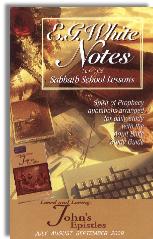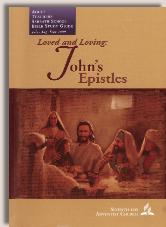|
||||||||||||||
Commentary on "Loving Brothers and Sisters"
Day 5: Wednesday, August 19, 2009
After giving us a “crisis of assurance” in yesterday's lesson, the author now begins to explain how love can be demonstrated in practice. The lesson is actually fairly good, with only two serious problem statements noted below.
The author states that John is “not content to theorize about love.” This is true. In fact, no Biblical author has “theorized” any of their material. The words of scripture themselves are inspired, and are therefore meaningful for us as truth which God has communicated to us. The author begins each of the three paragraphs at the top of the page with the phrases, “John is not content,” “John, of course, isn’t against,” and “John is opposed to.” Each of these phrases seems to indicate a bias of the lesson author. One must be careful to understand that, although John wrote these letters, he wrote them under the inspiration of the Holy Spirit and communicated exactly what God wanted him to communicate; nothing more, nothing less. The truth is, it is not John that is “not content” or “against” or “opposed to” but it is God.
The authors use of the word “theorize” may imply another bias of the author. It must be acknowledged that the official Church website, at the Biblical Research Institute, does indicate how inspiration was practiced by Biblical writers, even indicating that the writers themselves added their own words and thoughts to help clarify the original intent of God's message. Go to THIS HYPERLINK where you can read the following excerpt from Ellen White:
It is not the words of the Bible that are inspired, but the men that were inspired. Inspiration acts not on the man’s words or his expressions but on the man himself, who, under the influence of the Holy Ghost, is imbued with thoughts. But the words receive the impress of the individual mind. The divine mind is diffused. The divine mind and will is combined with the human mind and will; thus the utterances of the man are the word of God.
In the middle of the page is the second problem we encounter in this lesson. It is the question which reads, “Read 1 John 3:16 and 17. Which command is the harder one to follow, and why?”
As has been pointed out this week, the author is preparing you to accept the commandments (particularly the Ten commandments) as the ultimate expression of love that we have for God and for others. His identification and use of the word “command” in this question is carefully designed.
These two examples provided in these two verses (1 Jn. 3:16-17) are great examples of how a Christian is to love. However, using the word command is misleading. Neither is a command. Also, the identification of an actual practice in either of the two verses is misleading. Neither verse specifies a definite act that the believer can simply go and perform. One is that we “ought” to lay our lives down for the brethren, for fellow believers. In the context, although the death of Christ is stated, it is not necessarily allowing ourselves to be killed to spare another that is being pointed out here. The two verses can be taken as similar to a Hebrew parallelism. Each one is stating the same thing using slightly different language. The conjunction “But” at the beginning of verse 17 indicates that that information will help explain the previous point.
Using the world's goods that we possess for the help of fellow believers is a method of demonstrating God's love, and laying our lives. It is up to the individual Christian to identify the needs of his fellow believer and act accordingly.
Following this question, the author makes a wonderful statement. He says that, “we prefer to live our own comfortable lives.” This is very true, particularly here in the United States and in other developed nations. The “average” American lives in the top two percent of wealth ever accumulated in the history of the world. The “comfortable” Christians will definitely be judged harshly during the reward phase of the believer's judgment, perhaps having many of their works burned up.
The author then makes another great statement, “Of all the places that love must be manifested, no place is more important than in the home.” This is an important statement for any Christian to understand. It is in the home where we let our “guard” down. We don't expect to be attacked in the home the way we are constantly attacked by the secular world. Yet a disproportionately large number of children raised in Christian homes share stories of major traumatic events brought about by family members. Many Christians are simply not aware of the long-term effects their actions have on others in the home. Although the ideas presented by the lesson author are good, they are superficial.
Heart-to-heart talks, discussing sex at the appropriate time with your children, working through arguments rather than “letting the sun go down on your anger” are good starts. Once a family member can trust another family member with very deep and private information, then true love can begin to be expressed rather than just superficial kind acts.
Summary
- Overall, a decent lesson, with only a couple of problems.
- No Bible writer was a “theorist.” They wrote exactly what God instructed them to write; no more, no less.
- The word “command” used by the lesson author is misleading. In 1 John 3, neither verse 16 nor 17 contains a specific “command.” The word “ought” however, is a very strong word and identifies that the believer should pay attention here.
- Neither verse indicates a specific act, but the two verses together help explain what it means to lay our lives down for fellow believers. It is up to the individual Christian to identify the needs of fellow believers and act accordingly.
- The author makes two good statements: Many Christians live too comfortably, (particularly here in the United States,) and the home is the most important place where love must be demonstrated.
- The authors suggestions are superficial. To have a true Christian home, many things must be addressed including sex, drugs, relationships and responsibility (not just by children, but by parents, too!)
Copyright 2009 BibleStudiesForAdventists.com. All rights reserved. Revised August 18, 2009. This website is published by Life Assurance Ministries, Glendale, Arizona, USA, the publisher of Proclamation! Magazine. Contact email: BibleStudiesForAdventists@gmail.com.
The Sabbath School Bible Study Guide and the corresponding E.G. White Notes are published by Pacific Press Publishing Association, which is owned and operated by the Seventh-day Adventist church. The current quarter's editions are pictured above.
Official Adventist Resources
Standard Edition Study Guide Week 8
Teacher's Edition Study Guide Week 8
Easy Reading Edition Study Guide Week 8
Search the Complete Published Ellen G. White Writings


